
Event Management Software: Enhancing Attendee Engagement
Events have become crucial to businesses, organizations, and personal celebrations in today’s fast-paced world. Whether it’s a corporate conference, a wedding, a music festival, or a fundraising gala, successful event planning requires meticulous organization and coordination of numerous moving parts. This is where event management software comes into play – a powerful tool designed to streamline the event planning process, save time, reduce stress, and ensure a seamless experience for everyone involved.
What is Event Management Software?
A complete platform known as event management software gives event planners a single point of contact for all things related to organizing an event. Numerous features and capabilities are available, such as guest list management, ticketing and registration, coordinating venue and vendors, task scheduling, budgeting, and reporting. Event management software removes the need for numerous spreadsheets, email threads, and paper trails by combining these disparate elements into a user-friendly interface. This reduces the possibility of misunderstandings and guarantees that everything is noticed.
Key Features of Event Management Software
Event Registration:
It lets attendees sign up for the event online, streamlining the registration technique and capturing attendee facts correctly.
Ticketing:
Enables organizers to sell tickets online, manage ticket inventory, and offer various ticket types and pricing options.
Attendee Management:
Provides tools for managing attendee information, including tracking registrations, sending confirmations and reminders, and managing attendee lists.
Agenda Management:
Helps create and manage event agendas, including scheduling sessions, speakers, and activities. Attendees can view the agenda and customize their schedules.
Venue Management:
Assists in managing venue details, such as floor plans, room layouts, seating arrangements, and logistical information.
Speaker and Sponsor Management:
Facilitates communication and coordination with speakers, sponsors, and exhibitors, including managing speaker profiles, sponsor agreements, and exhibitor logistics.
Marketing and Promotion:
Offers tools for marketing and promoting the event, including email campaigns, social media integration, promotional discounts, and referral programs.
Networking and Engagement:
Provides features to facilitate networking and engagement among attendees, such as matchmaking algorithms, attendee directories, messaging capabilities, and interactive features like live polling and Q&A sessions.
Analytics and Reporting:
Generates reports and analytics on various aspects of the event, including attendance metrics, registration data, revenue tracking, and attendance.
Integration and Customization:
It integrates with other tools and platforms, such as CRM systems, email marketing software, and payment management software, and it allows for customization to suit specific event requirements and branding.
Benefits of Using Event Management Software
Using event management software offers many benefits for organizations’ time and efforts involved in the event. Here are some of the key benefits:
Efficiency:
Event management software automates many tasks in planning and organizing events, saving organizers time and effort. Tasks such as registration, ticketing, communication, and scheduling can be streamlined, allowing organizers to focus on other aspects of event planning.
Increased Attendance:
Event management software offers the benefits of online registration and ticketing support, which can lead to improved attendance. Attendees can easily check-in for the occasion and buy tickets from anywhere with a web connection, eliminating attendance limitations.
Enhanced Communication:
Event management software facilitates communication between organizers, attendees, speakers, sponsors, and exhibitors. Organizers can send timely updates, reminders, and announcements to attendees, keeping them informed before, during, and after the event.
Improved Planning and Organization:
Event management software helps organizers plan and execute events more effectively by offering agenda, venue, and attendee tracking features. Organizers can easily create and manage event agendas, track voicemails, and monitor attendee registrations and preferences.
Better Engagement:
Event management software offers tools to enhance attendee engagement before, during, and after the event. Features like networking opportunities, interactive sessions, and live polling can encourage participation and interaction among attendees, speakers, and sponsors.
Data Insights:
The event control software program presents details of attendee conduct, choices, and engagement metrics. Organizers can analyze statistics, registration numbers, session attendance, and feedback to enhance future events and tailor their services to attendee hobbies.
Cost Savings:
Event management software can help organizers save money by automating manual strategies and decreasing the need for paper-based materials. Accelerated attendance and improved performance can also result in a higher return on funding for occasion organizers and sponsors.
Scalability:
Event control software is scalable and bendy, making it appropriate for activities of all sizes, from small conferences to massive conferences and alternate indicates. Organizers can effortlessly customize the software program to fulfill their occasion’s precise wishes and requirements, regardless of scale.
Types of Event Management Software
Conference Management Software:
Designed for planning and organizing conferences, this software typically includes features for managing speaker sessions, abstract submissions, attendee registrations, and sponsor/exhibitor coordination.
Event Registration Software:
It focuses primarily on streamlining the event registration process. It allows attendees to register online and choose ticket options and provides organizers with tools to manage registrations, payments, and attendee data.
Event Planning Software:
Offers comprehensive event planning and organization tools, including features for creating event timelines, managing budgets, coordinating vendors, and tracking tasks and deadlines.
Venue Management Software:
These specifically designed platforms specialize in event-related aspects, such as booking and evening floor plans, coordinating catering and AV services, and handling on-site logistics.
Ticketing Platforms:
These platforms specialize in selling and distributing event tickets online. They typically offer features for creating ticket types, setting pricing, managing ticket inventory, and integrating with payment gateways for secure transactions.
Event Marketing Software:
Focuses on promoting events and attracting attendees. It includes features for email marketing, social media promotion, content management, and analytics to track the effectiveness of marketing campaigns.
Virtual Event Platforms:
Designed for hosting online or hybrid events, these platforms offer features for live streaming, virtual networking, interactive sessions, and attendee engagement tools like chat, polls, and Q&A sessions.
Trade Show Management Software:
It is tailored specifically to organize trade shows and exhibitions. It includes features for booth management, exhibitor registrations, floor plan layouts, lead capture, and post-event analytics.
Event Mobile Apps:
Provide attendees with a convenient way to access event information, schedules, maps, and networking opportunities on their mobile devices. These apps may also include features for live polling, messaging, and personalized agendas.
Event Feedback and Survey Tools:
Permit organizers to collect remarks from attendees through post-occasion surveys and critiques. These tools assist organizers in gauging attendee pride, identifying improvement areas, and acquiring insights for future occasions.
Top Event Management Software Solutions
Cvent
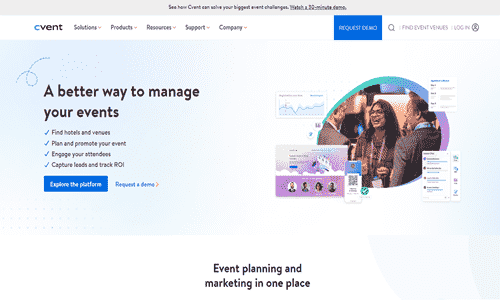
Cvent is a comprehensive event management platform offering features for event registration, venue sourcing, mobile apps, attendee management, and analytics.
Pros:
Robust feature set, scalable for events of all sizes, excellent custom port.
Cons:
Pricing can be expensive for smaller organizations, and there is an earning curve for new users.
Services Provided:
Event registration, venue sourcing, attendee management, event marketing, mobile apps, onsite solutions, and event analytics.
Pricing Package:
Pricing is available upon request and tailored to the specific needs of each event.
Eventbrite
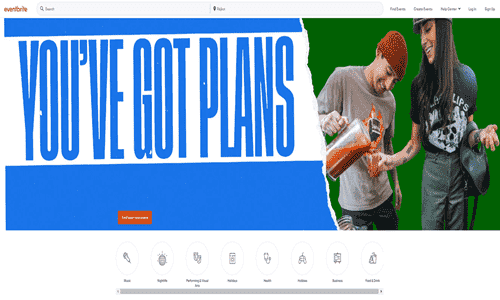
Eventbrite is a famous occasion control and ticketing platform that organizes events of all kinds and sizes, from live shows and galas to conferences and fundraisers.
Pros:
User-friendly interface, an extensive marketplace for event discovery, and social media integration.
Cons:
Transaction fees for ticket sales and land-limited customization options for event pages.
Services Provided:
Event registration, ticketing, event promotion, attendee management, and analytics.
Pricing Package:
Eventbrite offers a range of pricing plans, including a free option for free events. Paid plans include a service fee per ticket sold.
Bizzabo
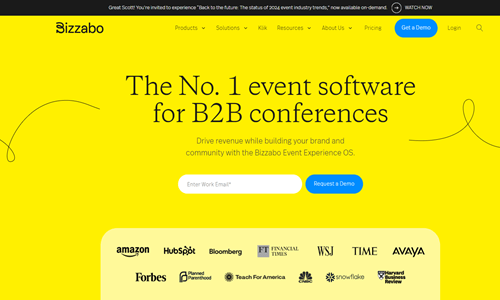
Bizzabo is an all-in-one event control platform designed to assist organizers in creating engaging and interactive events. It offers event registration features, event networking, and sponsorship control pricing.
Pros:
User-friendly interface, robust networking features, customizable event websites.
Cons:
Limited integration options with other software; pricing may be high for smaller events.
Services Provided:
Event registration, website creation, attendee networking, sponsor management, and vent analytics.
Pricing Package:
Bizzabo offers tiered pricing on event needs and size, with pricing available upon request.
Splash

Splash is a sleek, customizable event management platform that creates beautiful event experiences. It offers event promotion, registration, guest check-in, and post-event follow-up features.
Pros:
Intuitive design, flexible customization options, seamless guest check-in experience.
Cons:
With limited reporting and analytics features, pricing may be higher for larger events.
Services Provided:
Event promotion, registration, guest list management, check-in, and post-event surveys.
Pricing Package:
Splash offers tiered pricing plans based on event size and needs, with pricing available upon request.
Aventri
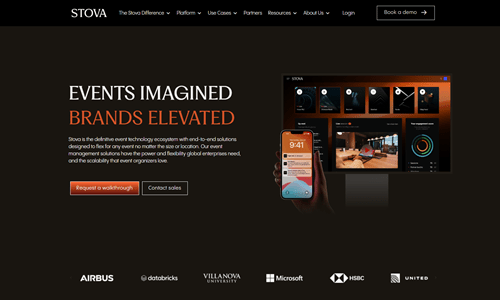
Aventri is a comprehensive event management platform offering features for event registration, website creation, attendee engagement, and event analytics.
Pros:
Robust feature set, customizable event websites, extensive reporting capabilities.
Cons:
Complex pricing structures may require training for new users.
Services Provided:
Event registration, website, attendee engagement, event marketing, onsite solutions, and event analytics.
Pricing Package:
Aventri offers customized pricing based on event requirements, with pricing available upon request.
RegFox
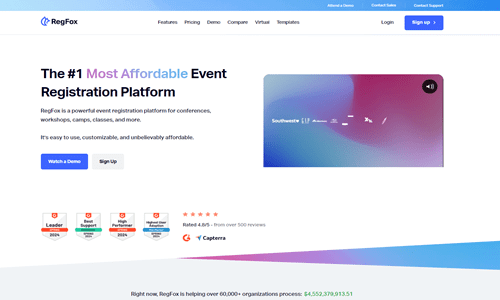
RegFox is a user-friendly event registration and ticketing platform known for its customizable registration forms, seamless payment processing, and robust reporting features.
Pros:
Easy-to-use interface, no ticketing fees, customizable registration forms.
Cons:
Limited marketing features and basic design options for event pages.
Services Provided:
Event registration, ticketing, payment processing, reporting and analytics.
Pricing Package:
RegFox offers a simple pricing structure with a flat fee per transaction and no additional ticketing fees.
Whova
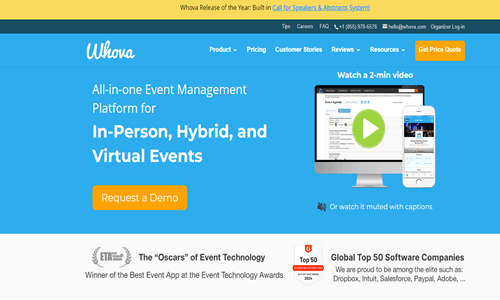
Whova is a comprehensive event management platform that offers features for occasion with registration, networking, attendee engagement, and event advertising and marketing.
Pros:
Robust networking features, interactive event agenda, easy attendee check-in.
Cons:
Pricing may be higher for larger events, with limited customization options for event websites.
Services Provided:
Event registration, attendee networking, event agenda, event marketing, and vent analytics.
Pricing Package:
Whova offers tiered pricing plans based on event size and needs, with pricing available upon request.
Eventzilla
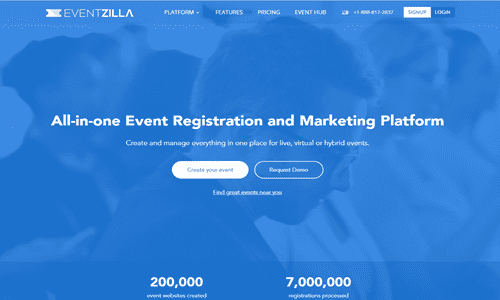
Eventzilla is a simple yet powerful event management platform offering vent registration, ticketing, promotion, and attendee management features.
Pros:
Easy setup and customization, affordable pricing plans, and social media integration.
Cons:
Limited design options for event pages, fewer advanced features comp. The other platforms.
Services is the base price, Provided:
Evregistrarrare action, ticketing, event promotion, attendee management, and reporting.
Pricing Package:
Eventzilla offers tiered pricing plans based on event needs. The base price is the flat fee per ticket sold, and additional features are available as add-ons.
EventMobi
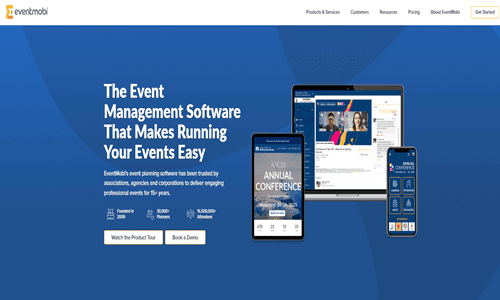
EventMobi is a versatile event management platform offering features for event registration, mobile event apps, attendee engagement, and event analytics.
Pros:
Customizable mobile event pandas and extended engagement features like live polling and Q&A.
Cons:
Pricing may be higher for larger areas, and the earning curve may be higher for new users.
Services Provided:
Event registration, mobile event apps, attendee engagement, and event analytics.
Pricing Package:
EventMobi offers tiered pricing plans based on event size and needs, with pricing available upon request.
How to Choose the Right Event Management Software
Define Your Needs:
Start by identifying your specific event requirements. Consider factors such as the type and size of your event, your budget, the number of attendees, and the features you need (e.g., registration, ticketing, attendee engagement, analytics).
Research Available Options:
Studies exceptional event control software program answers to be had in the market. Search for systems that offer the functions you want and feature fantastic popularity for reliability, user-friendliness, and customer support.
Read Reviews and Testimonials:
Read reviews and testimonials from other event organizers using the software program you’re considering. Note remarks about the software’s ease of use, reliability, customer service, and whether it met their event wishes.
Request Demos and Trials:
Touch the software carriers and request demos or loose trials in their platforms. This lets you check the software program’s features, personal interface, and capability to peer if it meets your needs and alternatives.
Consider Integration:
Consider whether the event management software integrates with other gear and systems you operate, such as CRM systems, email marketing software programs, or fee gateways. Integration can streamline procedures and improve performance.
Evaluate Pricing:
Think about the pricing shape of each software answer and decide whether it fits within your budget. Pay attention to hidden prices or additional expenses for added features or services.
Assess Customer Support:
Search for occasion management software program vendors that provide dependable customer service, live chat, email support, telephone help, online resources, expertise bases, and tutorials. Spark-off and useful help may be precious if you encounter any problems or need help.
Check Scalability:
Consider whether the occasion control software is scalable and can be developed according to your event wishes. Pick a platform that can accommodate activities of different sizes and complexities, from small conferences to huge meetings or exchanges.
Review Security and Compliance:
Ensure that the event management software complies with data protection regulations and offers robust security features to protect sensitive attendee information and payment details.
Get Feedback from Stakeholders:
Finally, gather feedback from key stakeholders involved in the event planning process, such as event organizers, marketing teams, and IT departments. Consider their input and preferences when making your final decision.
Implementation and Integration
Implementing and integrating event management software into your event planning process is crucial. Here’s a guide to effectively implement and integrate event management software:
Needs Assessment:
Begin by undertaking an intensive wishes assessment to discover the particular requirements of your event and the goals you need to attain with the software. Consider factors that include the sort and scale of your occasion, the range of attendees, and the features you want.
Select the Right Software:
Choose event management software that aligns with your event needs and goals. Look for a solution that offers the required features, is user-friendly, and fits your budget.
Implementation Planning:
Increase an in-depth implementation graph outlining the steps and timeline for deploying the event management software program. Assign duties to team participants and establish clear conversation channels.
Data Migration:
If you’re transitioning from manual processes or switching from another software platform, ensure a smooth data migration process. Transfer relevant data such as—Configureists, event schedules, and registration information to the new software.
Customization and Configuration:
Customize the event management software to suit your branding and requirements—Configure settings, templates, and workflows to align with your event goals and streamline processes.
Training and Onboarding:
Provide comprehensive training and onboarding sessions for event organizers, staff, and volunteers using the software. Offer tutorials, documentation, and hands-on practice to ensure users are comfortable with the platform.
Integration with Existing Systems:
Integrate the event management software with other tools and systems you use, such as CRM software, email marketing platform before the event orms, and payment gateways. This data flows and streamlines processes across different systems.
Testing and Quality Assurance:
Conduct thorough testing of the event management software before the event to identify any issues or bugs. Test various features, workflows, and scenarios to ensure everything functions as expected.
Feedback and Iteration:
Gather feedback from users during the implementation process and after the event. Use this feedback to improve the software’s implementation for future events.
Continuous Support and Maintenance:
Provide ongoing support and maintenance for the event management software to address any issues, updates, or enhancements. Stay proactive in resolving issues and optimizing the software for future events.
Common Challenges and Solutions
Implementing event management software can come with its own set of challenges. Here are some common challenges and solutions to help overcome them:
Resistance to Change:
Challenge:
Some team memsoftware’software’sd advantages to unfamiliarity or fear of change.
Solution:
Provide comprehensive training and support to help users become comfortable with the new software. Highlight the software’s benefits and advantages to encourage buy-in from team members.
Integration Issues:
Challenge:
Integrating event management software with existing systems and tools can be complex and may lead to compatibility issues.
Solution:
Choose event management software with robust integration capabilities and work closely with IT professionals to ensure smooth integration. Test integrations thoroughly before deployment to identify and resolve any issues.
Data Security Concerns:
Challenge:
Storing sensitive attendee information and payment details in event management software raises data security and privacy. concerns
Solution:
Select event management software that prioritizes data security and compliance with relevant regulations. Implement encryption, access controls, and regular security audits to safeguard attendee data.
User Adoption Challenges:
Challenge:
Getting all crew individuals to completely embody and correctly use the occasion control software program may be tough.
Solution:
Offer ongoing training, help, and assets to help users maximize the software’s advantages. Encourage colored help and verbal exchange among crew members to efficiently share tips and quality practices for using the software program.
Scalability Issues:
Challenge:
Event management software lacking scalability may need help accommodating growing event needs and requirements.
Solution:
Choose event management software that is scalable and flexible, capable of handling events of various sizes and complexities. Regularly assess your event needs and upgrade the software as necessary to support growth.
Technical Issues and Downtime:
Challenge:
Technical glitches, downtime, or system failures can disrupt event planning and execution.
Solution:
Choose event management software with a reliable track file of uptime and performance. Work carefully with the software company to solve any technical problems promptly and enforce contingency plans to limit disruptions.
Customization Limitations:
Challenge:
Event management software with limited customization options may only partially align with your event branding and requirements.
Solution:
Pick event management software that offers full customization capabilities. This will allow you to tailor the platform to fit your occasion’s unique needs and branding. Work with the software program company to implement customizations correctly.
Cost Management:
Challenge:
Managing the costs associated with event management software, including licensing fees, subscription costs, and additional features, can be challenging.
Solution:
Conduct a radical cost-benefit analysis to determine the revenue management software’s return on investment (ROI). Choose a software solution that offers transparent pricing and meets your budget constraints. Identify utilization and compare the need for extra features to optimize costs.
Future Trends in Event Management Software
Hybrid and Virtual Event Solutions:
With increasingly recognized digital and hybrid occasions, event control software must conform to these codecs. Future solutions can also provide greater virtual event features, including immersive 3-D environments, interactive networking possibilities, and live streaming abilities.
Artificial Intelligence (AI) and Machine Learning (ML):
AI and ML technologies will play a giant role in occasion management software, enabling predictive analytics, personalized guidelines, and automatic approaches. AI-powered chatbots can also be included in occasion platforms to provide on-the-spot support and help to attendees.
Data Analytics and Insights:
Event management software will increasingly provide advanced data analytics and insights to help organizers understand attendee behavior, preferences, and engagement levels. Predictive analytics algorithms may be used to forecast attendance, optimize event marketing strategies, and improve event ROI.
Enhanced Engagement Features:
Destiny event control software will prioritize attendee engagement by providing interactive functions like stay polling, Q&A sessions, gamification factors, and virtual networking possibilities. These features will create more immersive and interactive event reviews for attendees.
Integrated Event Marketing Platforms:
The event control software program will combine seamlessly with advertising and marketing automation platforms, permitting organizers to create targeted email campaigns, social media promotions, and personalized communications to draw and interact with attendees. Integration with consumer relationship control (CRM) structures will permit better monitoring and management of attendee relationships.
Blockchain Technology:
Blockchain technology may be integrated into event management software to enhance security, transparency, and trust in event transactions and data management. Blockchain-based ticketing systems could prevent fraud and scalping, while smart contracts could streamline vendor agreements and payments.
Accessibility and Inclusivity:
Future occasion management software will prioritize accessibility and inclusivity, ensuring that activities are accessible to attendees with disabilities and diverse wishes. Functions of closed captioning, translation offerings, and assistive technologies could be integrated to accommodate all attendees.
Sustainability Initiatives:
Event management software will increasingly support sustainability initiatives by offering features to minimize environmental impact, such as digital event materials, carbon footprint tracking, and eco-friendly venue sourcing options. Sustainable event management practices will become a key consideration for organizers and software providers.
Mobile-First Experiences:
As mobile usage continues to rise, event management software will prioritize mobile-first experiences, offering intuitive mobile apps for organizers and attendees. Mobile apps provide on-the-go access to event information, schedules, networking opportunities, and interactive features.
API Integrations and Open Platforms:
Event management software will embrace open platforms and API integrations, allowing seamless integration with third-party tools, services, and data sources. This flexibility will enable organizers to customize and extend the functionality of their event platforms to suit their specific needs and workflows.
FAQs
Can event management software handle both in-person and virtual events?
Yes, many event management software solutions are designed to support both in-person and virtual events. They offer features such as registration, ticketing, live streaming, virtual networking, and attendee engagement to accommodate various event formats.
How secure is attendee data stored in event management software?
Event control software program prioritizes data security and typically employ encryption, get admission to controls, and regular security audits to guard attendee data. Moreover, compliance with data safety regulations, which includes GDPR, ensures that attendee records are treated securely.
Can event management software integrate with other tools and platforms we use?
Yes, event management software programs frequently provide integration capabilities with CRM structures, email marketing structures, price gateways, and other gear. This allows seamless statistics to go with the flow and streamline the system across distinct structures utilized in occasion-making plans and control.
Is event management software customizable to fit our event branding and requirements?
Many event control software solutions provide substantial customization options, allowing organizers to tailor the platform to match their event branding, requirements, and choices. This includes customizing event websites, registration forms, and electronic mail templates.
How does event management software handle attendee engagement during virtual events?
Event management software for virtual events typically includes features for interactive sessions, live polling, Q&A sessions, virtual networking, and gamification to enhance attendee engagement. These features create immersive and interactive event experiences for virtual attendees.
What kind of support is available for troubleshooting and assistance with event management software?
Occasionally, software providers provide numerous help options, including electronic mail, cell phones, live chat support, online resources such as knowledge bases and tutorials, and dedicated purchaser success managers. This guarantees prompt help and resolution of any issues or questions during event planning and execution.
Conclusion
In conclusion, event management software has revolutionized how events are deliberate, organized, and done. With its comprehensive features, seamless integrations, and emphasis on attendee engagement and security, the event management software program offers a powerful solution for occasion organizers to create memorable and successful events. By leveraging the trendy technological improvements and embracing destiny developments, the event control software program keeps adapting to fulfill the converting needs and expectations of occasion experts and attendees alike. With its capacity to streamline techniques, decorate communication, and deliver immersive event studies, occasion management software remains vital for orchestrating activities of all sizes and formats.




